What is Leadership and How to Be a Good Leader

#LeadandLift | Episode 37 | Dr. Jacqueline Howard
Leadership: One of my favorite topics to talk about. Often we say, “we’re not leaders”, but each one of us is a leader because we do influence people around us, including our children. We influence people in the corporate space, in our own businesses, and in our family.
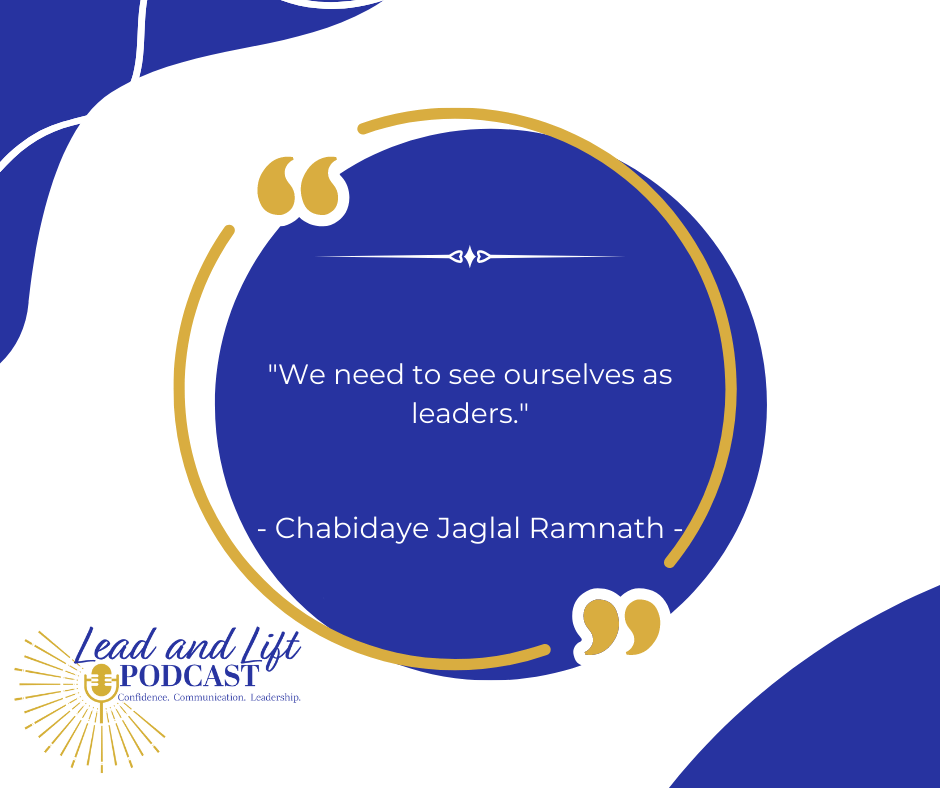
Today, I introduce you to Lead and Lift Podcast’s Special Guest, Dr. Jacqueline Howard, who is an entrepreneur, ordained elder, and independent John Maxwell speaker, trainer, and coach. Dr. Howard is also the author of Angels Leading God’s Way and co-author of an Amazon Best Seller, The Successful Mind. She’s joined us to share how to define a good leader, how to identify leadership characteristics, and how to grow your own leadership skills
Dr. Jacqueline Howard: How to Define a Good Leader
Dr. Howard acknowledges that a lot of times we don’t really think of ourselves as being leaders, but that we all are leaders to some extent. Sometimes it just takes that one lightbulb moment for us to identify that we truly are a leader in one way or another.
Dr. Howard’s lightbulb moment occurred in college when a professor asked the classroom, “What is leadership?”. After multiple hands went up with answers that didn’t please the professor, he finally said, “Leadership is influence”.
At that moment, Dr. Howard understood that we cannot lead people unless we have enough influence to impact them to make them want to follow us and the vision we have. Therefore, leadership is, indeed, influence.
According to Dr. Howard, a good leader is one of those people who is not so concerned about talking to be heard, but they should be more concerned about talking to commit. If you’re just talking to be heard, you’re really not concerned about whether they’re receiving, understanding, and following your train of thought. But good leaders are so very in tune with the person they’re speaking with. Good leaders are born to be able to assess you and know if they’ve made a statement, they should be reading your body language to see if their message was understood or not. A good leader will see if the receiver didn’t get the message and will restate it and go back to find out where and how the leader is connecting or disconnecting from the receiver of the message.
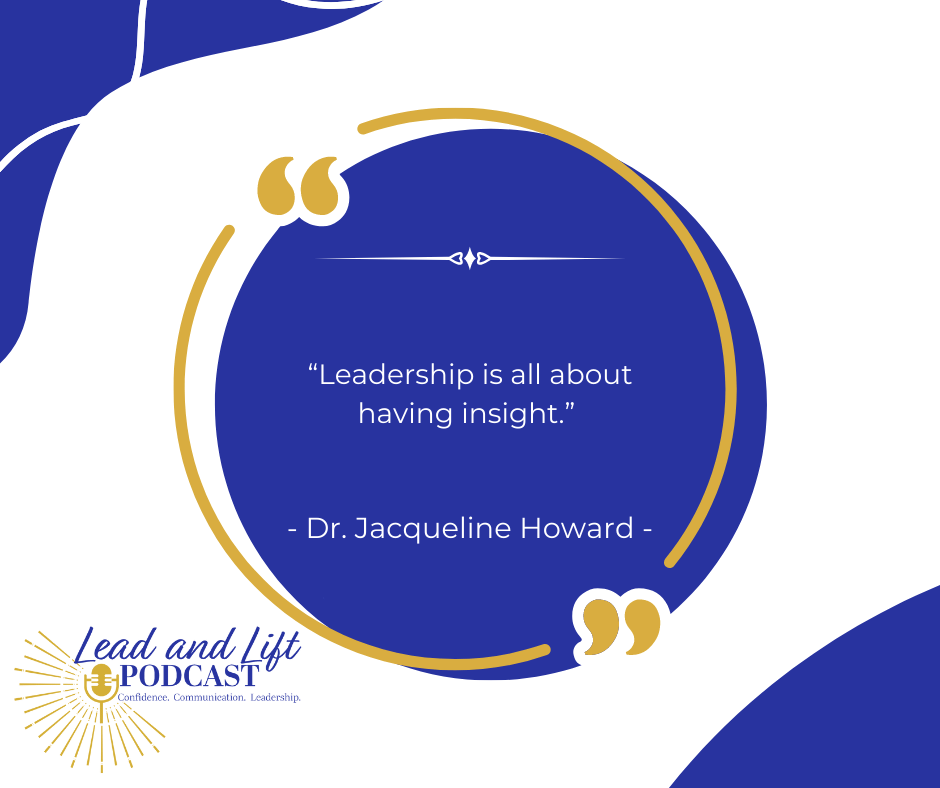
A good leader is able to look ahead and have a track record of completing things. Your track record should be able to show people you are knowledgeable, have completed some tasks and goals, and are willing to help others.
One piece Dr. Howard really loves about defining a good leader is that a good leader is a servant leader. Meaning, being a person who is willing to help others get to where they need to be, being willing to help others grow, and being willing to invest in others. When people know you’re willing to invest in them, they’ll give you 100% and will really get on board because they know you care.
Dr. Howard touched on the relationships leaders create, and I couldn’t agree more with the importance of that because when leaders create a relationship with you, you want to work with that leader, help build their vision, and go on the journey with them since they value you. Who doesn’t want to be valued?
She also touched on servant leadership which boils down to the idea that:
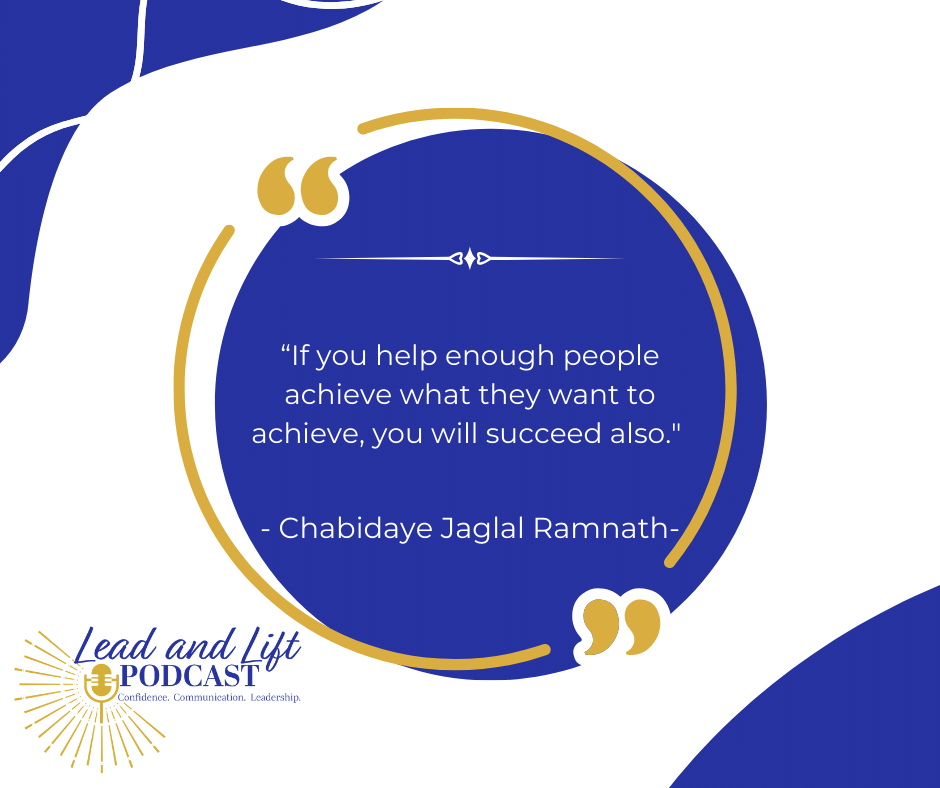
Oftentimes when we have a team, a leader is going somewhere with a vision they have and they need to have people go along with them. If no one is going along with them, they’re not truly a leader because no one is following.
Dr. Howard supported this belief by adding that John Maxwell has taught her if you were to climb to the top of the mountain by yourself, you’re not leading, you just went on a long hike. The whole part of leadership is taking people along with you. In order to do that, you have to meet people where they are. If someone isn’t able to succeed with the skills they have at that moment, your leadership duty is to help them learn the new skills. The leader isn’t always the person in front. Sometimes they’re behind you, gently nudging, and sometimes they’re walking alongside you or in front of you, but a good leader knows when they need to shift their position.
I can confidently say Dr. Howard is not the only individual who believes in this and shares this message of meeting people where they are at. Dr. Ellen Moran, a previous special guest on Lead and Lift Podcast’s Summit Series, spoke of meeting people at their bus stop. Dr. Moran clarified that if you want to connect with people, you meet them at their bus stop. You wouldn’t just stand at your bus stop and expect people to show up, you must go pick them up where they’re at. Dr. Moran’s interview was just as amazing as this one, and I encourage you to listen to her here.
Dr. Jacqueline Howard: How to Identify Leadership Characteristics
Dr. Howard uses an acronym of RISE to identify leadership characteristics as leaders should RISE. So let’s break this down piece-by-piece.
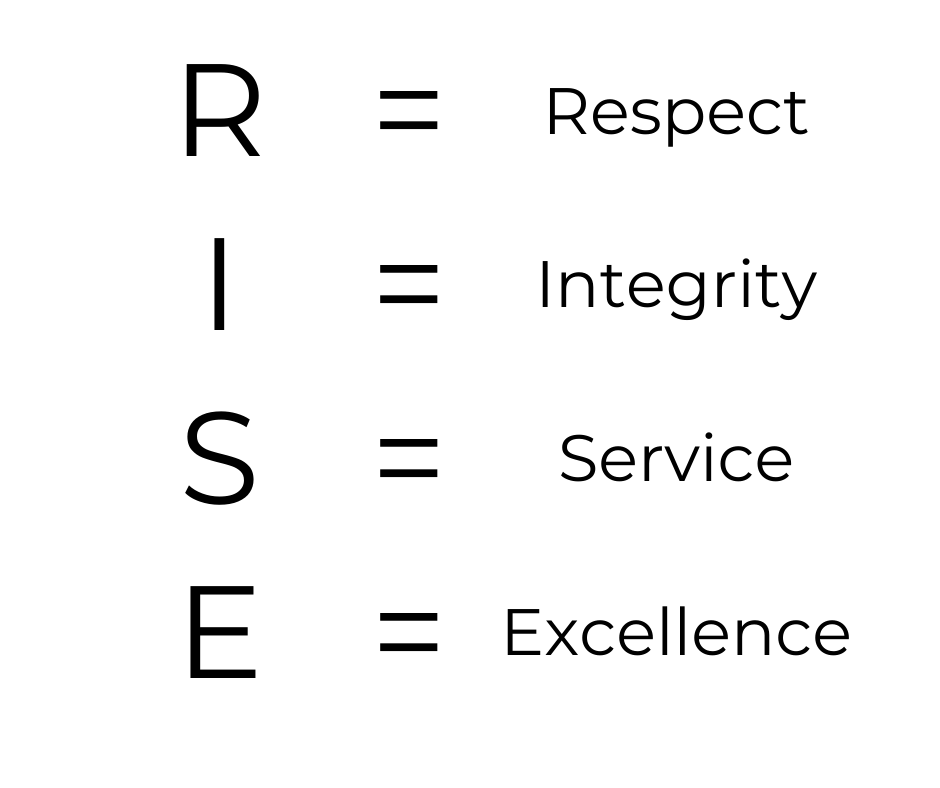
R for Respect — A good leader will respect other people for who they are and for whatever stage of life they are in. A good leader will respect themselves as well. If something goes wrong, the leader should respect their team and themselves by being mature enough to quickly say, “I did that. I made an error. Let’s see how we can fix that,” because when you assume the responsibility of the errors you made, people will respect you to a higher level.
I for Integrity — A good leader will do what they say they are going to do or vice versa if they say they are not going to do something, then they shouldn’t do it. The leader should carry themselves in a way that they are showing integrity.
S for Service — A good leader is a servant leader: serving others.
Ask yourself:
- Am I being a service leader?
- Am I adding value to other people?
- What is that value?
- How am I helping to build others?
- How am I helping to develop others?
- How am I working as a team?
E for Excellence — Leaders are to do things of excellence. You’re not always going to do things perfectly, but you are to do them to the best of your ability.
So again, leaders should RISE. Respect. Integrity. Service. Excellence. These are characteristics to identify when looking for leadership. A leader with these characteristics is respectful to people and capable of showing empathy, is able to open their ears and listen to not only what is being said but also to what body language is saying, and is continually looking and listening with the heart. A good leader will always RISE.
Dr. Jacqueline Howard’s Advice for How to Grow Your Own Leadership Skills
Let’s face it, in our own eyes, we’re the most important person. So why not find out more about yourself? What makes you tick? What are you great at?

Dr. Howard agrees the first place to start is with yourself. John Maxwell says, “You have to know yourself to grow yourself.” You have to look inward.
You must learn about yourself by asking questions like What things motivate you?
You should also write down 50 things you’re good at. While going through that thought process, acknowledge your strengths and the areas you need to develop more.
Be more self-aware.
Oftentimes, we dwell, think, ponder, and look at those things we are weak at for far too long. But in becoming a better leader, you should look at it a different way.
- What things am I good at?
- How can I work at those things to make them even better?
Perfect the things you are already good at and be willing to step out of your comfort zone in order to be better.
Part of stepping out of your comfort zone will also include determining if you’re willing to do what it takes to reach your goal. Consider, “Do you want to invest that much time?” Often we have goals and set out to reach them, but we don’t realize how much time, effort, and sacrifice is going into accomplishing the goal. Sometimes along the journey you might think that’s not important enough for me to do that, I’m not going to sacrifice, I’m not going to do these things. That’s your truth, but you need to know those things and learn how to first do a good assessment of what you’re willing to do and how far you’re willing to go to accomplish that goal.
And while you’re assessing yourself, Dr. Howard reminds you to encourage yourself. We, as leaders, have people who are wanting to be more. But the first thing she likes to encourage is to know you are already more than enough. You are created that way. She encourages us to stop comparing ourselves to others. We don’t know their journey, we don’t know how much time they’ve invested developing that one thing you look for when you see and say, “oh they’re so great.”
In talking with Dr. Howard on this topic, it brought to my attention the added importance of self-leadership which I believe is one of the most difficult things to do. You have to get yourself to meet the RISE characteristics.
Dr. Howard’s advice on helping ourselves meet the RISE characteristics is to establish self-discipline. To uphold your personal integrity, you must be accountable, but you don’t have to do it on your own. She suggests having an accountability partner because if you say you’re going to do something but don’t set a date or time and don’t tell anyone else about it, then it doesn’t matter if you reached your goal or not. If you simply connect with someone as an accountability partner on this leadership journey and set a date, it will probably happen.
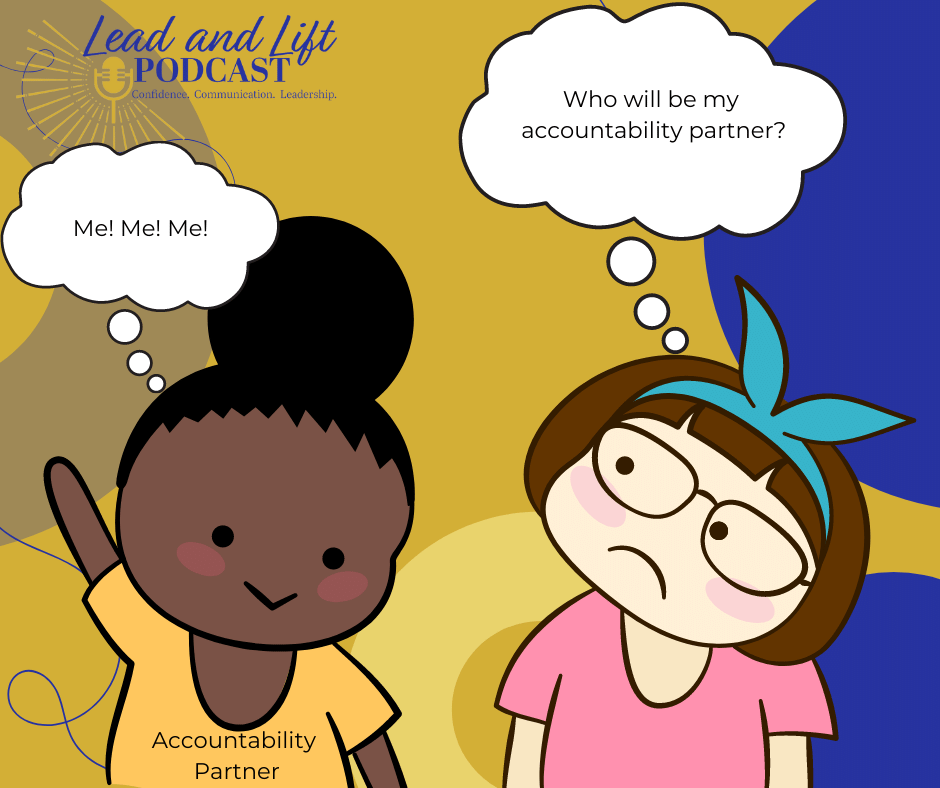
She guarantees the percentage of chances the goal will be met is much greater with an accountability partner because you have someone supporting you, and you know someone is counting on you and cheering you on to achieve your goal. So chances are (and stats prove this), you are more successful by having an accountability partner instead of you just counting on yourself to do it.
Don’t know where to find an accountability partner? Start by seeking out Mastermind Groups where you can be surrounded by like-minded people with common goals who are about positivity to help you move forward with goals and ideas.
Go Forth and Lead!
We’ve learned so much from collaborating with Dr. Jacqueline Howard, and I challenge you, my friend, to start your leadership journey by simply looking inward. Follow the steps, ask yourself questions, assess your goals and hold yourself accountable.
One eye-opening tool for me was the John Maxwell DISC which focuses on communication and motivation. It really helped me in the way I communicate with my spouse and my children because let’s face it, each one of us is a leader and an influence not only in our professional lives but also for our children. We all want to make sure our children get the best, and we know we’re influencing them constantly as they’re growing up.
Dr. Howard further states that developing leadership skills is one of the things she believes needs to start early on in life. It’s one of the pieces we, as parents, as mothers, are able to nurture in our children. Give your children small tasks, allow them to make decisions, allow them to grow, and they will be more confident in making those leadership decisions.
Dr. Jacqueline Howard is such an influential individual who has developed into a strong, positive leader willing to share her insight to anyone in leadership or who wants to be a leader in her book, Leading God’s Way. It’s aligned not only to the scriptural aspect meaning good leadership is saying you’re doing the things God has already said we should do such as treating others how we like to be treated. When you lead in God’s way, you are about people, you want to add value to people, and you want to lead and lift.
Leave a 5-Star Rating & Positive Review on Apple Podcasts!
This helps me support more people - just like you- gain more joy and fulfillment in their business and personal life.
Links mentioned in this episode:
- Dr. Jacqueline Howard Twitter
- Dr. Jacqueline Howard Facebook
- Dr. Jacqueline Howard Instagram
- Dr. Jacqueline Howard Website
- Dr. Jacqueline Howard Book
Links mentioned in this episode:
Stay connected with the latest episodes via email
Expert interviews, actionable takeaways and behind-the-scenes Leadership, Communication and Confidence secrets from experts and so much more, delivered to your inbox weekly.
Don't worry, your information will not be shared.

